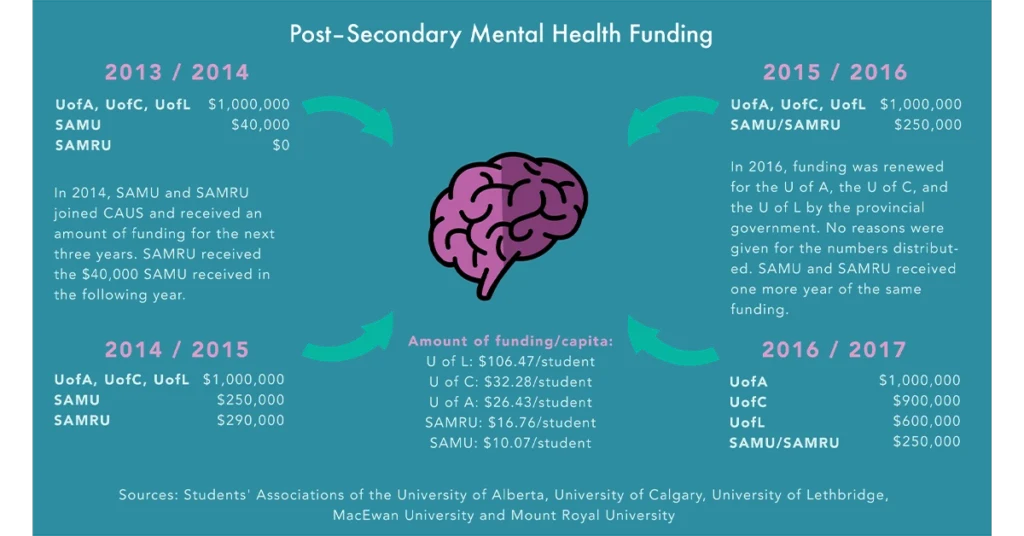Mental health funding for post-secondary institutions is a crucial part of creating healthy environments for students. However, as the three-year pilot program
from the government of Alberta comes to an end, institutions across the province are apprehensive about the future of the funding. As a result, the Students’ Association of MacEwan University (SAMU) president is left uncertain about whether the students she represents will get their fair share.
In a 2011 study of University of Alberta students, researchers found students reported higher levels of mental health issues than the North American average, and at the University of Calgary, severe psychiatric disorders increased more than 500 per cent in eight years.
In 2013, the provincial government committed $10.5 million to fund three years of Alberta post-secondary mental health initiatives. Of that money, $9 million was to be distributed equally among the members of the Council of Alberta University Students (CAUS). In 2013, the only members were the University of Alberta, University of Calgary, and the University of Lethbridge, who each received $1 million a year for three years.
The remaining $1.5 million was split between all members of the Alberta Student Executive Council (ASEC), which currently represents 16 colleges and polytechnic schools across the province.
MacEwan University and Mount Royal University were both on the verge of becoming full-fledged universities, but were included in the ASEC budget at the time of the agreement.
The money given to ASEC was distributed directly to student associations instead of school frontline services, so SAMU, not MacEwan, received $40,000 for the 2013/14 year as a member of ASEC.
MacEwan and Mount Royal are now members of CAUS, but are still governed underneath the same section of the Post-Secondary Learning Act that deals with colleges and polytechnic schools.
Both schools advocated for the same funding as the original members of CAUS, but received only $250,000 a year for three years, compared to the $1 million their other university counterparts received.
“U of A, U of C, and U of L all independently got $1 million (in 2013),” said Danika McConnell, president of SAMU. “ They’ve done amazing things with (the funding); they’ve been able to cut their wait times in over half the time it used to be, bring on more staffing. It’s incredible what they’ve been able to do with what’s been granted to them. They’ve been able to do a lot more because they have a lot less students.”
MacEwan University, which has a student population more than twice the size of the University of Lethbridge, received less than half the funding of the University of Lethbridge. Over the past four years, SAMU has received $10.07 per student to fund mental health programs, while the U of L received $106.47 per student. is remains unexplained, as the current government has not come forward with any statements regarding the mental health funding programs originally put in place by the provincial Progressive Conservative government.
The uncertainty of continued support from the government sparked the need to campaign for a continuation of funding from the government. Students from MacEwan emailed over 600 letters to Minister of Health Sarah Ho man and the Minister of Advanced Education Marlin Schmidt to express the need for these programs, with the fear the money could disappear.
The University of Alberta, University of Calgary, University of Lethbridge, and ASEC all received extended funding for the 2016-17 year, but because MacEwan and Mount Royal still had a year left on their promised funding, the two universities did not receive additional extensions.
Once again, student governments are unsure of government intentions with funding these programs.
“The biggest issue at hand is just not knowing where this funding is headed, and if it’s coming back,” said McConnell.
These programs are vital for many students at MacEwan, as few students would be able to afford the counselling they need on a student budget. They also provide a safe space for many students dealing with any form of mental illness.
According to the Centre for Addiction and Mental Health, those aged 15 to 24 are most likely to experience mental illness or substance abuse disorders.
A significant amount of university students fall into this age demographic, reinforcing the need for guaranteed mental health services in post-secondary institutions. More than 750 new students received an initial counselling (IC) service at MacEwan between July 1, 2015 and May 31, 2016.
“A significant majority of students coming in for a walk-in or initial consultation were actively engaged in the possibility of withdrawing because of compounded issues jeopardizing their academic success,” said Catherine Davis-Herbert, executive director of student a airs at MacEwan University.
“Nearly six per cent of these students were actively contemplating suicide, which required safety plans and mobilizing other resources.”
The need for wellness services in post-secondary institutions is undeniable, which makes the lack of concrete answers on extended funding all the more concerning. Unfortunately, the government is not expected to reveal any answers until the 2017 budget is released.

In an email from Schmidt’s press secretary Michael McKinnon, he said students should not be concerned that their mental health resources may be disappearing.
“Minister Schmidt has heard firsthand from students and administrators about how important mental health funding is,” he said. “The minister has made it clear that our government recognizes how critical it is to provide these supports on Alberta’s campuses.”
Schmidt’s press secretary also added that an advisory panel of students, psychology professionals, and representatives from Alberta Health Services and Canadian Mental Health Association is being put together.
This panel will develop ideas on how the government can support campus mental health programs, as well as build upon best practices and initiatives that emerged from university and ASEC campuses previously. is panel is said to report to the minister by spring 2017, and new models may be implemented by fall.
As this panel is just in its preliminary stages, the SAMU president is not yet at ease.
“We keep hearing that (the government) is reviewing things,” said McConnell. “We keep telling them that we think that it should be on a per-student basis.”
As this new panel begins to develop ideas for creating the best grant programs, students have the ability to share their opinions and potentially make a difference. Per-student grants would bring more funding to MacEwan and help improve the current state of mental health programming for students.
“Additional personnel increases our capacity, decreases wait times, gets people helped sooner, and also allows for multidisciplinary services support and provision which is best practice,” said Davis-Herbert.
The grant money MacEwan has received allowed for the hiring of registered psychologists and social workers, and has strengthened the Wellness and Psychological Services department, according to Davis-Herbert.
The additional staff has reduced wait times from four to six weeks to one to two days, and strengthened statistical rigour and scope, which allows a comparison of universities and best practices. Along with this, the money helped the wellness staff focus on providing students with faster access, improved risk mitigation, and helped to support collaborations with community service agencies.
“Adjustment issues to post-secondary learning, developmental issues associated with young adulthood and mental health concerns exacerbated by academic, financial, or familial stressors are typical reasons for accessing our services,” says Davis-Herbert. “Nearly 70 per cent of the students seen through (IC) or walk-ins are assessed to be functioning at the treatment level and do require ongoing appointments for treatment related to various mental health concerns.”
Students face an ever-changing environment, and that can cause a lot of emotional and physical stress. e wide use of well- ness services at MacEwan should show the Alberta government, and the panel being created, just how necessary they are.
“The last thing we want as student leaders is to see our students in distress and in fear that something that’s helping them to lead and live a better life could be fleeting,” said McConnell.
The Wellness and Psychology services are essential to many students, and the fear that the funding for these programs may not be a permanent xture is very much alive. However, representatives from the Alberta government have stated on many occasions that mental health is an important issue, and that they believe these programs are necessary for creating a healthy atmosphere in both schools and cities.
McKinnon maintained that the provincial government is committed to creating supportive and healthy post-secondary mental health environments. As for McConnell, she said the importance of a mental health support system is essential for university students.
“(University is) high-pace, and there’s always a lot going on, and you need to find balance,” said McConnell. “I think post-secondary institutions are a phenomenal place to bring those best (mental health) practices to young people.”
Illustrations by Alley MacLean.





0 Comments